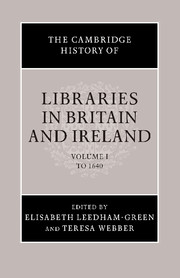Book contents
- Frontmatter
- Introduction
- The physical setting
- Part One The medieval library
- Part Two Reformation, dissolution, new learning
- Part Three Tools of the trade
- 13 Universities and colleges
- 14 Major ecclesiastical libraries: from Reformation to Civil War
- 15 Clerical and parish libraries
- 16 Schools and schoolmasters (to c. 1550)
- 17 School libraries (c. 1540 to 1640)
- 18 Common lawyers and the Inns of Court
- 19 Medical libraries
- 20 Heralds’ libraries
- Part Four Libraries for leisure
- Part Five Organisation and administration
- Select bibliography
- General index
- Index of manuscripts
- References
18 - Common lawyers and the Inns of Court
from Part Three - Tools of the trade
Published online by Cambridge University Press: 28 March 2008
- Frontmatter
- Introduction
- The physical setting
- Part One The medieval library
- Part Two Reformation, dissolution, new learning
- Part Three Tools of the trade
- 13 Universities and colleges
- 14 Major ecclesiastical libraries: from Reformation to Civil War
- 15 Clerical and parish libraries
- 16 Schools and schoolmasters (to c. 1550)
- 17 School libraries (c. 1540 to 1640)
- 18 Common lawyers and the Inns of Court
- 19 Medical libraries
- 20 Heralds’ libraries
- Part Four Libraries for leisure
- Part Five Organisation and administration
- Select bibliography
- General index
- Index of manuscripts
- References
Summary
Law is a profession which still requires its leading specialists to own large collections of books, and this was equally true before our period, when Chaucer’s serjeant had ‘cas and doomes alle | That from the tyme of kyng William were falle’. Indeed, at the start of our period these private libraries were the only libraries of the common law in being, and they could hardly have constituted more than a shelf- or case-full, even for a judge. By 1600 the typical library would have been much larger, and Sears Jayne has been deservedly criticized for not recognising lawyers as a book-owning class in the Renaissance period.
Personal libraries
We do not have any reliably complete inventories of lawyers’ libraries before the Stuart period, and there are not many even then. There are plenty of mentions of law books in wills, but these seem to be selective. It was only necessary to make specific bequests of the more valuable or splendid contents of a library, and the workaday volumes were either left generically to a relative who seemed inclined to the law or passed over in silence. Several probate inventories of lawyers have survived and have been published, and they are remarkable for the low proportion of law books: for example, of over forty volumes listed as belonging to Sir Roger Townshend (d. 1493), justice of the Common Pleas, only sixteen were legal; of the thirty-six volumes listed in the library of Mr Serjeant Kebell (d. 1500), only four were legal; an inventory of John Holgrave (d. 1487), baron of the Exchequer, lists only a book of chronicles, a Gesta Romanorum, two printed books of statutes, a printed Littleton, and ‘an olde boke of lawe in paper’ while that of Chief Baron Urswyk (d. 1479) included a Chaucer but no professional books at all.
- Type
- Chapter
- Information
- The Cambridge History of Libraries in Britain and Ireland , pp. 448 - 460Publisher: Cambridge University PressPrint publication year: 2006

